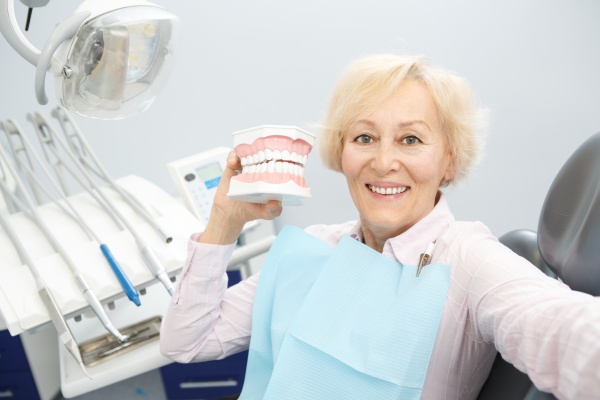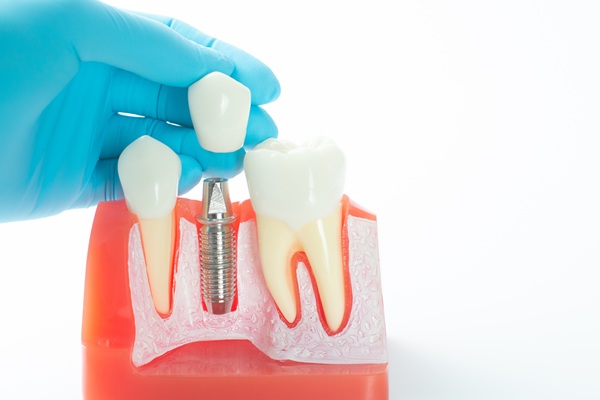Eating With Partial Dentures and What to Avoid

Partial dentures are used to replace missing teeth when you still have most of your natural teeth. Even though the dentures help restore your smile, they can take time to get used to, especially when it comes to eating.
Eating with partial dentures and what to avoid
Exercise patience
Eating with partial dentures is not the same as eating with your natural teeth, which means there will be an adjustment period before you are comfortable. Even though it might be frustrating at first, you have to exercise patience.
Chewing with your natural teeth is easier because the nerves in your teeth transmit signals to your brain, telling it how hard or soft to chew the food in your mouth. If you have partial dentures, the artificial teeth do not have a connection to your brain, which will make chewing difficult at first.
Start out with soft foods like eggs, vegetables, fish and cereal before moving up to meats and harder foods. You should also make sure you cut your food into small bite-size pieces to make chewing easier.
Avoid using your front teeth
If your partial dentures are in the front of your mouth, biting down on food will be difficult and can damage your dentures. Instead of biting down on something like an apple with your front teeth, you should cut it into smaller pieces with a knife, making it easier to chew the food while limiting any damage to your dentures.
Stay away from certain foods
When you have partial dentures, there are specific foods you should avoid to prevent damage to your dentures. These include:
- Peanuts/peanut butter: Like all sticky foods, peanut butter should be avoided at all costs because of the damage it does to dentures
- Steak: If you are a meat lover, this will be a tough one to give up, but it is one of the sacrifices you have to make if you have dentures, because chewing tough meats can put a great deal of pressure on your dentures and the gums underneath, leaving you in pain
- Hard candy: Biting down on hard candy can cause serious damage to your dentures, costing you money in the process; this does not mean you cannot enjoy candy, it just means that if you must have hard candy, you need to suck on it instead of biting down on it with your dentures
- Popcorn: Popcorn kernels get lodged in your teeth, are a hassle to get out and can cause damage to your partial dentures, especially if you accidentally bite an unpopped kernel
Brush your dentures regularly
Having dentures does not mean you stop practicing good oral hygiene. Make sure to brush and clean your partial dentures regularly to avoid the inflammation of your gums and the decay of your remaining natural teeth.
Conclusion
Eating with partial dentures will take a little getting used to, but if you follow the steps provided, you should be able to enjoy most of the food you used to eat before you got the dentures. Ask your dentist for tips on how to eat without damaging your dentures.
Request an appointment here: https://dentalimplantsoakland.com or call Oakland Dental Implant Center at (510) 257-2284 for an appointment in our Oakland office.
Check out what others are saying about our services on Yelp: Read our Yelp reviews.
Recent Posts
It is essential to visit a family dentist every six months to maintain proper oral health. While it is possible to keep the teeth and gums suitably clean with appropriate brushing and flossing techniques, excellent home care is never a substitute for professional cleanings and preventative care. However, there are more benefits to routine dental…
Learning about the many benefits of dental implants is something everyone who is missing teeth needs to do before making a final tooth-replacement choice. The fact that there have been many improvements in the dental niche over recent years means that dental patients have more choices than ever before. Ready to learn more about this…
Cold sores are a common viral infection that can cause discomfort, pain, and self-consciousness. Fortunately, cold sore laser treatment is a highly effective solution for managing these viral outbreaks, offering fast relief and promoting quicker healing. This approach targets the affected area directly, reducing the intensity of symptoms and preventing future flare-ups.Cold sores, also known…
You may have recently had a dental checkup and been told that you have gum disease. While no one likes to find out they have a gum infection, there are various treatment options available, depending on the severity of your condition. Laser periodontal treatment, for example, is a minimally invasive alternative to conventional treatments.Periodontal disease,…


